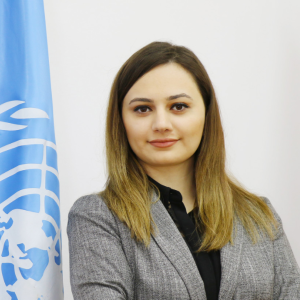Mobile clinics are delivered to Shamakhi to enhance the primary healthcare services
06 July 2021
- As part of the PROACT-Care project implemented by WHO Azerbaijan, 3 mobile clinics and 2 four-wheel drives are delivered to Shamakhi and handed over to TABIB to help to make primary healthcare more accessible and provide services in hard to reach villages in the district.

Mobile clinics will help to timely diagnose and control non-communicable diseases among the population, improve infection prevention and control measures and provide better mother and child healthcare services.
The project funded by the United States Agency for International Development (USAID), British Embassy in Baku, and Universal Health Coverage Partnership initiative (a joint initiative of WHO and its partners) aims to develop a high quality, accessible and comprehensive primary healthcare model tailored for the needs in Azerbaijan. It will also support local communities to live healthier lives and empower them to care for their own health. WHO Azerbaijan partners with the Executive Power of Shamakhi District, Ministry of Health of Azerbaijan, State Agency for Mandatory health Insurance, TABIB, Heydar Aliyev Foundation, and UNICEF for implementation of the project.
Tahir Mammadov, Head of Shamakhi District Executive Power noted in the handover event in Damirchi village of Shamakhi district that, as in all of the regions of Azerbaijan, a lot of work has been done in the healthcare sector in Shamakhi as part of the health reforms carried out in the country. He stressed that, along with already done work, this project will help to improve the quality of the primary healthcare services provided to the population in Shamakhi, particularly those living in remote villages.
According to Lee Litzenberger, United States Ambassador to Azerbaijan, “the United States is committed to the continued support to Azerbaijan as we all face a trying time in history. Only by working hand in hand can we defeat COVID-19”.
James Sharp, British Ambassador to Azerbaijan noted “The UK is committed to supporting the healthcare sector in Azerbaijan and I am sure these mobile clinics will make a significant difference to those living in rural areas where access to healthcare is most difficult.” According to him, “Not only will the mobile clinics strengthen primary healthcare to better respond to COVID 19 but also ensure the delivery of other essential health services, including neonatal, maternal and childcare in rural areas.”
Dr. Rahim Aliyev, Deputy Minister of Health of Azerbaijan, emphasizing the importance of international cooperation, information exchange and international assistance during the COVID-19 pandemic, noted that the development of primary health care would both help the state to better cope with non-infectious chronic diseases and infectious diseases, and help to improve population’s health.
The chairman of TABIB, Dr. Ramin Bayramlı said that according to the experience during the pandemic, countries with strong primary health care systems had more successfully managed the COVID-19 pandemic. According to him, the project is very important from this point of view and its goals overlap with the goals of the healthcare reforms being conducted in Azerbaijan.
Mr. Soltan Mammadov, Member of the Health Committee at the Parliament of Azerbaijan, and Director of International Relations Department at the Heydar Aliyev Foundation emphasized the necessity of having efficient primary healthcare service for a strong healthcare system and noted that the Foundation is ready for continues support to the “PROACT-Care” project.
Dr. Hande Harmanci, WHO Representative in Azerbaijan highlighted that the PROACT-Care project is a product of comprehensive teamwork between WHO and its national and international partners and donors. According to her, mobile clinics delivered as part of the project will not only serve to scale up primary healthcare capacity – a key component of every sustainable healthcare system, but also be helpful in COVID-19 response in the Shamakhi district.
After the handover event, the participants inaugurated WHO’s training center in Shamakhi where they were informed about other ongoing and planned activities within the PROACT-Care project. It was noted that the primary healthcare model implemented in the Shamakhi district is envisioned to be scaled up to the entire country in the future.



